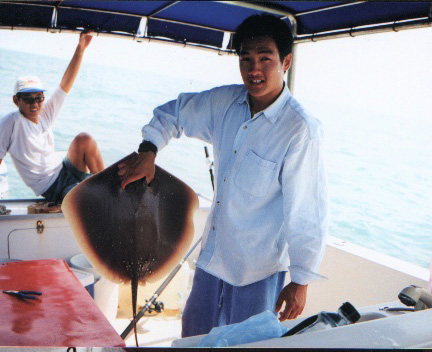|
 I
have found the best baits for stingrays are kembung (mackerel)
strips, live prawns and live squid. Live squid is preferred when fishing
at night as they emit a luminous glow in the water, thus attracting not
only stingrays but possibly other species such as Golden Snapper (Angchoh
/ Jenahak). The terminal tackle is simple. A bottom fishing rig
complete with spreader and a leader of about 4 feet long should suffice. I
have found the best baits for stingrays are kembung (mackerel)
strips, live prawns and live squid. Live squid is preferred when fishing
at night as they emit a luminous glow in the water, thus attracting not
only stingrays but possibly other species such as Golden Snapper (Angchoh
/ Jenahak). The terminal tackle is simple. A bottom fishing rig
complete with spreader and a leader of about 4 feet long should suffice.
Stingrays
are excellent fighters especially on medium tackle. The sudden initial
rush followed by line spewing out from the reel can catch the angler by
total surprise and these are the times when inexperienced anglers panic
and tighten the drag, resulting in line snapping with a loud WHACK!
 After
the initial run, the stingray will stay on the bottom, using its round
body as resistance against the pressure from the angler's rod. This can
take quite a long time if it is a big ray and can really test the patience
of the angler. In situations such as this, the best thing to do is try
to 'short stroke', pumping the rod (make sure your drag is set to slip
slightly) so that the ray is faced with an uneven force, causing it to
be irritated and make a run. Some old anglers swear by clipping on a heavy
sinker to the mainline and dropping it down to frighten the ray to move.
As far as I am concerned, this method has not worked for me. (Maybe I
was doing it wrong?) After
the initial run, the stingray will stay on the bottom, using its round
body as resistance against the pressure from the angler's rod. This can
take quite a long time if it is a big ray and can really test the patience
of the angler. In situations such as this, the best thing to do is try
to 'short stroke', pumping the rod (make sure your drag is set to slip
slightly) so that the ray is faced with an uneven force, causing it to
be irritated and make a run. Some old anglers swear by clipping on a heavy
sinker to the mainline and dropping it down to frighten the ray to move.
As far as I am concerned, this method has not worked for me. (Maybe I
was doing it wrong?)
When
the ray is on the move, it is easier to control and lift the ray up the
water column with smooth pumps of the rod. Usually when a ray manages
to come off the ground, this signals the end of the big struggle as the
ray succumbs to exhaustion.
 When
landed, pregnant female stingrays will usually give birth to several young
stingrays. They actually look like brown coloured pieces of 'won ton'
(Chinese meat dumplings). These should be released immediately into the
water. Male stingrays have two protrusions which are sexual reproductive
organs near the tail area while these are absent from the female. All
stingrays also have one or more sharp 3 - 5 inch spikes just on top of
the tail near the body and this should be avoided at all costs. Upon landing
a stingray, use a pair of pliers and pick off these spines immediately
to render the ray harmless. The ignorant angler will find himself in much
agony if pricked. When
landed, pregnant female stingrays will usually give birth to several young
stingrays. They actually look like brown coloured pieces of 'won ton'
(Chinese meat dumplings). These should be released immediately into the
water. Male stingrays have two protrusions which are sexual reproductive
organs near the tail area while these are absent from the female. All
stingrays also have one or more sharp 3 - 5 inch spikes just on top of
the tail near the body and this should be avoided at all costs. Upon landing
a stingray, use a pair of pliers and pick off these spines immediately
to render the ray harmless. The ignorant angler will find himself in much
agony if pricked.
Stingrays around the 3 - 8kg
are best eating while any bigger would taste tough and the ammonia smell
in the flesh would put off anyone anyway. The smaller ones (less than
2kg) should be released to fight another day. The best method to cook
stingray is with curry. However, smaller stingrays around 3kg can be steamed
Teochew style (with sour plum, preserved salted vegetable and ginger)
when freshly caught.

No, that little
stingray was not caught from the bathroom!. (Dan with a ray prior to gutting)
|

